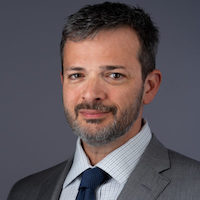 As part of the Meet the Controller/CFO series, the Controllers Council recently interviewed Glenn Hopper, CFO of Sandline Global, a legal tech company.
As part of the Meet the Controller/CFO series, the Controllers Council recently interviewed Glenn Hopper, CFO of Sandline Global, a legal tech company.
Glenn is a former Navy journalist, a filmmaker, and a business founder, and Glenn spent the last two decades helping startups transition to going concerns, operated scale, and prepare for funding and/or acquisition. He’s passionate about transforming the role of Chief Financial Officer from historical reporter to forward looking strategist. He’s served as a finance leader in a variety of industries, including telecommunications, retail, internet, and legal technology. He has a master’s degree in finance with a graduate certificate in business analytics from Harvard University and a master’s degree in business administration from Regis University. Glenn’s married with three children and he’s also a member of American Mensa and volunteers his time for the Analytics Foundation, helping nonprofits to digitally transform their organizations. In his free time, Glenn is an avid runner and cyclist, and he’s also an author of a new book that we’ll talk about.
Following are some questions from moderator Neil Brown , and answers from Glenn Hopper. If you are interested in learning more, view the full interview video archive here.
Q: What inspired you to pursue a career in corporate finance?
A: I think like everyone as a little kid, it was either going to be astronaut, firefighter, professional football player, President of the United States, or a corporate finance guy. So, I chose corporate finance guy out of that and no, it was a circuitous path to get here. I don’t know how many people have a direct shot into corporate finance, but in undergrad I was on the seven year program. I think I changed majors four or five times. I went from mechanical engineering, to philosophy, to literature, and then to journalism, and that’s where I landed was on journalism. And I worked for a while in that space. And then I did a stint in marketing, and I enjoyed the creative endeavors, but I’ve got this OCD nature that I think a lot of us in accounting and finance do where you’re looking for more objective truth that you can just find in the numbers.
And there was just, even when I was working in marketing, I became the numbers guy for the marketing department. And then once I started getting into Excel and really living in spreadsheets and building models, I felt like, hey, I’ve found my calling here.
Q: What about significant keys to your success?
A: Maybe some of the diversity in my background is key to the success in a lot of ways. I think the same things that drove me to the field are keys to the success. I think you must be intellectually curious. You must have a good foundation in statistics, and probability, and math, and a comfort with numbers, but it’s also being able to really communicate the numbers.
Q: What about sharing something interesting about your career that you didn’t expect or maybe even surprised you?
A: I think the communication element has been a pleasant surprise, but the biggest shock I had in my career was really a turning point in my career. And I was either going to just leave finance forever and go teach high school or do something else, maybe go write my science fiction novel or something. But years ago, when I was just starting out in finance, my sort of approach and the way that I wanted to move up or the way that I found was the most expedient way to move up was to just take as much work as I could.
Q: Talk about your new book, Deep Finance.
A: I think why I wrote Deep Finance is I’m compelled to tell the story of the problems that I’ve overcome and some that I’m still working through. But I think one of the ways that I resolve issues is by taking copious notes and then sort of crafting a narrative around them. And because of this, when I go through something, I think, oh, if I’m having this problem, maybe someone else is too.
But I had an interesting opportunity, I contributed to an anthology for a publisher called Leaders Press and the anthology was on persistence. I think the name of the book was Perseverance. It’s the art of going through and I’d written in that about comparing professional careers to a marathon and you have your ups and downs and two things that I knew a lot about, running marathons and being an old guy running through a lot of career stuff. I found analogies in that. But after I contributed to the anthology, that book did well and the publisher reached back out and said, just wanted to know if I had any other ideas for a book. And I said, “Well, it turns out it’s a very niche market, but I’m very passionate about finance automation and what changes are happening in corporate finance.”
I talk about the changes that are going on in finance right now. And the way I see it, I can’t think of a single finance function right now that there’s not some off the shelf software out there, cloud based, that you can automate, whether it’s, and I won’t shill for any products or anything, but whether it’s expense tracking automation, or accounts payable, accounts receivable, there’s even bank reconciliation software. Download the preview of his eBook here.
To learn more, view the full discussion here.




